|
|
|
Sort Order |
|
|
|
Items / Page
|
|
|
|
|
|
|
| Srl | Item |
| 1 |
ID:
000445
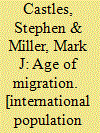

|
|
|
|
|
| Edition |
2nd ed
|
| Publication |
London, Macmillan, 1998.
|
| Description |
xx, 336p.
|
| Standard Number |
0333732448
|
|
|
|
|
|
|
|
|
|
|
|
Copies: C:2/I:0,R:0,Q:0
Circulation
| Accession# | Call# | Current Location | Status | Policy | Location |
| 041747 | 325/CAS 041747 | Main | On Shelf | General | |
| 042914 | 325/CAS 042914 | Main | On Shelf | General | |
|
|
|
|
| 2 |
ID:
004634


|
|
|
|
|
| Publication |
Houndmills, Macmillan, 1993.
|
| Description |
ix, 307p; maps ,figures
|
| Standard Number |
0333534921
|
|
|
|
|
|
|
|
|
|
|
|
Copies: C:1/I:0,R:0,Q:0
Circulation
| Accession# | Call# | Current Location | Status | Policy | Location |
| 035497 | 325/CAS 035497 | Main | On Shelf | General | |
|
|
|
|
| 3 |
ID:
092311
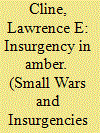

|
|
|
|
|
| Publication |
2009.
|
| Summary/Abstract |
Multiple ethnic insurgencies have existed in Myanmar since independence. The military junta's response has been extremely brutal at the tactical level, but has shown some political astuteness at the strategic level, with a series of ceasefires with most of the ethnic groups. Despite these ceasefires - most of which have resulted in the continued existence of quasi-independent armed groups - other ethnic movements have continued their armed operations. The overall strategic picture is one of stalemate, with the ethnic movements continuing to exist, but with few realistic prospects of expanding their operations.
|
|
|
|
|
|
|
|
|
|
|
|
|
|
|
|
| 4 |
ID:
108583
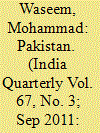

|
|
|
|
|
| Publication |
2011.
|
| Summary/Abstract |
Underlying Pakistan's three experiments with a federal arrangement in the form of the 1956, 1962 and 1973 constitutions, there has been a persistent concern about constraining the numerical majority of the largest province, first East Bengal and later Punjab. The first two constitutions had virtually eliminated the federal principle in West Pakistan by merging the four provinces and various princely states into one megaprovince called One-Unit in order to establish parity between the two wings of the state. In post-Bangladesh Pakistan, while the 1973 Constitution provided a strong centre with scant provincial autonomy, it tacitly acknowledged the linguistic majorities of the four provinces as legitimate representatives of their respective federating units. Together, these developments brought the issue of provincial autonomy to the centre of the stage in Punjab-dominated national politics championed by the three smaller provinces of Sindh, Balochistan and Khyber-Pakhtunkhwa. 37 years after the promulgation of the 1973 Constitution, the 18th Amendment finally addressed this issue with full strength. Pakistan in the following half decade is expected to experience what by all means is going to be a tempestuous process of shifting several ministries and divisions from the federal to provincial capitals. There can be resistance from the army and the centralist bureaucracy against the perceived dilution of state authority on the one hand and 'minorities' from the three smaller provinces against their perceived persecution at the hands of the majority communities of these provinces on the other.
|
|
|
|
|
|
|
|
|
|
|
|
|
|
|
|
| 5 |
ID:
114184
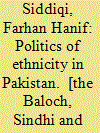

|
|
|
|
|
| Publication |
Oxon, Routledge, 2012.
|
| Description |
150p.
|
| Standard Number |
9780415686143
|
|
|
|
|
|
|
|
|
|
|
|
Copies: C:1/I:0,R:0,Q:0
Circulation
| Accession# | Call# | Current Location | Status | Policy | Location |
| 056788 | 305.80095491/SID 056788 | Main | On Shelf | General | |
|
|
|
|
| 6 |
ID:
157108
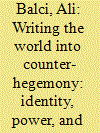

|
|
|
|
|
| Summary/Abstract |
This article is an attempt to develop a theoretical framework about how to study dissident ethnic movements’ foreign policies. Is it possible to speak about foreign policies of ethnic dissident movements, especially when it is considered that they have no characteristics of modern sovereignty such as territory and recognition? For example, do the Berbers in Morocco, the Catalans in Spain, the Balochs in Iran, and the Kurds in Turkey have a foreign policy? If they do, how do we study their policies toward the outside world? Specifically, focusing on the case of the Kurds in Turkey, this article attempts to provide a theoretical framework for how to study dissident ethnic movements’ foreign policy performances. By looking at the effect of the end of the Cold War on the Kurdish nationalists’ imagination of the United States, this article interrogates how the change in their imagination played a role in the construction and reconstruction of the post-1980 Kurdish identity in Turkey. It also draws on the work of poststructural and postcolonial Ernesto Laclau, David Campell, and Edward W. Said in order to develop the theoretical framework.
|
|
|
|
|
|
|
|
|
|
|
|
|
|
|
|
|
|
|
|
|